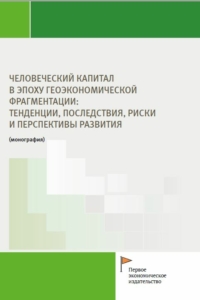Human capital in the era of geo-economic fragmentation: trends, consequences, risks and development prospects
Chernenko I.M.1, Kolyasnikov M.S.1, Zemzyulina V.Yu.1, Semenova I.I.1
1 УрФУ
Научное издание / монография
Выпущено ООО «Первое экономическое издательство»

Исследование выполнено за счет гранта Российского научного фонда № 23-78-10165, https://rscf.ru/project/23-78-10165/.
Please, cite as:
Abstract:
The monograph examines trends, risks and prospects for the development of human capital in the context of geo-economic fragmentation and the transition of the world economy from Industry 4.0 to Industry 5.0. In the context of polarization of geopolitical interests, blocks of countries are identified and strategies for adapting national education and health systems are analyzed. The study develops the concept of social reliability and identifies its role in ensuring adaptation in conditions of limited growth. The issues of measuring and determining the determinants of subjective well-being through investments in human capital are considered. It is shown that geo-economic fragmentation creates exclusively threats and risks for accumulated human capital, educational strategies of the population and health capital. In the long term, isolation poses a threat to the well-being of future generations and leads to stagnation of the national labor market, and the quality of accumulated human capital will be the main factor slowing the growth of the Russian economy in the coming decades while maintaining resource rents in the income structure. The conclusions are complemented by practical recommendations for representatives of the state, business and the academic community aimed at creating a resilient and adaptable workforce focused on solving the problems of a fragmented global economy.
Keywords: human capital, geopolitical fragmentation, digitalization, sustainable development, analysis, reliability, integrated approach, efficiency, labor market, risk
Страница обновлена: 29.05.2024 в 12:45:51
